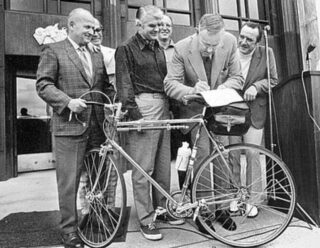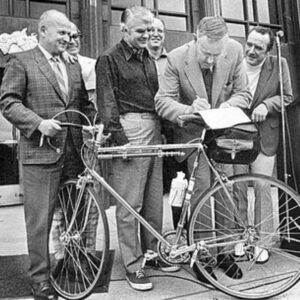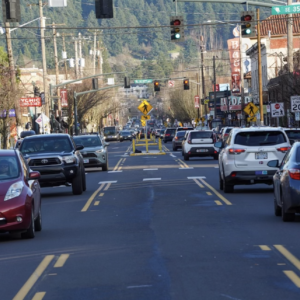ORS 366.514, a.k.a the Oregon Bike Bill, is back in the spotlight. Leaders and supporters of BikeLoud PDX are meeting today at noon to rally and then ride to the Multnomah County Courthouse to official file their lawsuit against the City of Portland.
If you don’t know much about the bill, don’t feel bad — many Oregonians and even city and state transportation leaders don’t know about it, either. But Portlander Hau Hagedorn does. And I just so happened to have talked to her about it earlier this week.
Hagedorn is the associate director of the Portland State University Transportation Research and Education Center, and she completed her master’s thesis on the policy implications of the Bike Bill in 2020. Hagedorn’s work gave advocates an in-depth, contextual analysis of the bill and its limitations. She was also a major player in the 2021 undertaking to increase spending in the Bike Bill. While this effort was ultimately unsuccessful, it brought renewed attention to the bill and in some ways was the spark that led to BikeLoud’s lawsuit.
Hagedorn is an advocate for increasing the Bike Bill’s annual expenditure requirements, but in her thesis she explores the bill’s inconsistent application and the myriad loopholes transportation agencies use to avoid compliance.

Hagedorn’s thesis points out how biking in Portland surged after the BTA won their lawsuit against the city in 1995, setting a precedent for all state transportation agencies to take heed of the law. Since then, the Portland Bureau of Transportation has built hundreds of miles of bikeways and is considered one of the best bicycling cities in the United States. Other smaller Oregon cities like Eugene and Corvallis, also saw a rise in bike mode share in the early 2000s.
But things have since stagnated. Hagedorn makes the case that stronger implementation of the Bike Bill could help spur a much-needed renaissance.
“While several factors may have contributed [to the decline in cycling], one thing that might help to stop the decline in biking is to amend and improve the Bike Bill,” Hagedorn wrote. “ORS 366.514 requires the provision of bicycle infrastructure, but the implementation of the law is still inconsistent and does not always result in the type of facilities that encourage more people to bike.”
Hagedorn has mostly focused on the Oregon Department of Transportation’s Bike Bill implementation (or lack thereof), and she didn’t offer comment on the BikeLoud lawsuit against the city. But if BikeLoud’s allegations hold up, the critiques against ODOT would seem to apply to other agencies as well.
“I’ve worked with quite a few ODOT staff and they believe in biking and walking, but I just don’t see the implementation happening at a pace where it actually makes a difference,” Hagedorn told me.
The problem is that a lot of the details of the Bike Bill are unclear. The basic gist is that transportation agencies must include bike and pedestrian infrastructure in all road improvement projects and spend a minimum of 1% of state highway funds to do so. But exactly what constitutes a “road improvement project” in the eyes of the law is open to interpretation.
BikeLoud’s lawsuit could be a game-changer for exposing the details of how cities in Oregon must follow the intent of the law. If the advocates get their day in court, PBOT officials will need to answer for their past decisions not to include bike infrastructure on streets like Hawthorne Blvd and many streets in northwest Portland that were completely reconstructed to build the Pearl District and still lack bike facilities.
And since the bill applies statewide, it would stand to reason that other communities in Oregon may benefit from Portland advocates pushing for stricter implementation. BikeLoud’s litigation could inspire would-be bike commuters from Ashland to Bend to Pendleton to hold their transportation leaders’ feet to the fire.
“If this lawsuit is successful, it would be capable of being replicated in other areas.”
– Scott Kocher, Forum Law Group and lead attorney on the suit
Scott Kocher, who will represent BikeLoud in their lawsuit, indicated as much when chatting with members at a meeting on Wednesday evening.
“If this lawsuit is successful, it would be capable of being replicated in other areas,” Kocher said.
Hagedorn firmly believes Oregon advocates should be more familiar with the nuances of the Bike Bill and hold leaders accountable to it. Communicating the details of legislation like this can be difficult, but BikeLoud’s lawsuit may get the ball rolling again.
“I think we need to share that information more widely so people understand. It’s not complicated policy, but it’s fairly nuanced,” Hagedorn told me.
“It’s just disappointing. Staff want to do the right thing. They believe in creating bike lanes and sidewalks, yet they continue to implement these unsafe facilities,” she said. “I just feel like we need more people out there to understand the implications of the Bike Bill and how we can use it to move things forward.”








Thanks for reading.
BikePortland has served this community with independent community journalism since 2005. We rely on subscriptions from readers like you to survive. Your financial support is vital in keeping this valuable resource alive and well.
Please subscribe today to strengthen and expand our work.